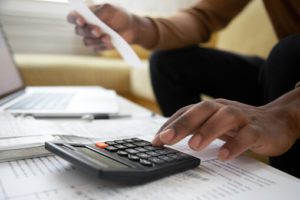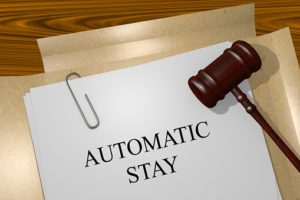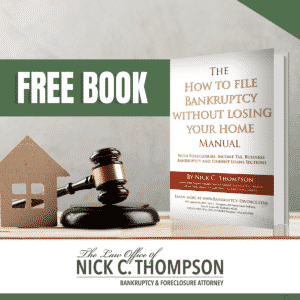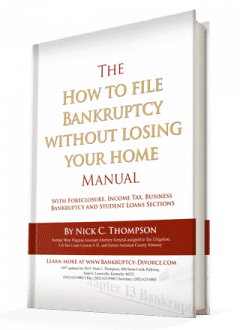The Chapter 13 bankruptcy co-debtor stay is effective immediately upon filing a plan that pays 100% of a cosigned debt. Similar sections also work in Chapter 12 and some 11 cases. At some time, you may have to file bankruptcy. However, you may also want to protect your co-signers, such as a non-filing spouse, who would otherwise be irreparably harmed. Usually, when you file bankruptcy, an automatic stay for co-debtors goes into effect under 11 USC 1301 (C). The automatic stay keeps creditors from collecting from the debtor or their property. The major exception to the automatic stay is when people repeatedly file Chapter 13 cases.
If there was a motion for relief from the stay and you dismiss your case 180 days after the prior Chapter 13, the stay ends after 30 days. In the new bankruptcy petition you have to request a new stay, which is not automatic. There is no stay if you had two prior Chapter 13 cases within the preceding year. Both the Debtor and the bankruptcy trustee can request the court to impose the automatic stay or co-debtor stay in a bankruptcy case.
Chapter 13 Co-Debtor Stay When Bankruptcy Filing
This stay can protect the co-signer in Chapter 13 or Chapter 12 under 11 USC 1201. The automatic stay is also available in an individual Chapter 11 bankruptcy case. However, to be clear, the co-signer stay only protects a person, not a business, who cosigned. The most complete co-debtor automatic stay protection is when you pay 100% of the cosigned debt. The co-signer is protected if the following is true:
- The debtor must receive the benefit of the debt under Bankruptcy Code section 11 USC 1301(c) 1. The car you bought must only be titled in your name. There is no co-debtor stay if the co-debtor also drives it and benefits from it.
- The plan must repay 100% of the debt – Bankruptcy Code section 11 USC 1301 (c) 2.
The co-signer is not protected if the following is true:
a. The creditor proves they will suffer irreparable harm by not collecting from the co-signer under Bankruptcy Code section 1301 (c) 3. If the debt is a credit card, tax debt, or medical debt, it is hard to prove irreparable harm. But if the car loan has an auto that is not covered by full coverage insurance or is depreciating rapidly, the creditor is probably subject to being irreparably harmed even in a 100% plan.
Chapter 13 Co-Debtor Stay Elements
The following are some of the elements and circumstances to consider for the co-debtor stay:
- The Chapter 13 plan is likely to be successful.
- There is little or no harm to the creditor. (often proved because the plan pays this debt 100%)
- The co-debtor stay prevents indirect collections from the debtor.
- The co-debtor stay terminates when the plan converts, closes, or is dismissed.
- It also automatically terminates 20 days after filing a motion to terminate the stay if there is no objection.
- If the consumer debts are paid in full, the obligation terminates.
1. Chapter 13 Co-Debtor Stays Need to Repay the Debt in Full

Other Chapter 13 considerations
Here are other local Chapter 13 issues you might need to know while preparing a bankruptcy petition.
- Chapter 13 plans can reduce an interest rate; 21% of loans are often reduced to 1 or 2% over the prime rate.
- Does the plan have to repay the proof of claim as it is filed? Usually, it does, or the order of confirmation may need modification.
- If the judge issues an order of confirmation that reduces the interest rate, does it still pay the consumer debt in full?
- If the creditor fails to object or appeal, is it bound by an order of confirmation it didn’t object? Generally, they are bound.
These are all interesting questions that often happen, but you never get the same answer from the courts in all the Circuits. Generally unless the debt is repaid in full, the debt can be collected from the co-debtor during the bankruptcy case. The co-debtor stay does not exist in Chapter 7.
2. Co-Debtor Stays are Only for Chapters 11, 12, and 13 Consumer Debts
Essentially, the stay covers the property of the estate, the debtor, and the co-debtor for consumer property and consumer debts. However, there is no co-debtor stay in Chapter 7 bankruptcy cases for business debt or a business. Still, creditors rarely pursue the business if the owner files bankruptcy, and Chapter 7 lasts for only 4 months usually anyway.
Therefore, the co-debtor stay only exists in repayment plans such as Chapter 13 bankruptcy relief, where consumer debt is being repaid. The co-debtor stay only exists for consumer debt incurred, such as personal loans, family, medical bills, credit card debt, car loans, and household purposes. This definition comes directly from statute 11 U.S.C. 1301.
For instance, the co-debtor stay protects your co-signer if you buy a recreational fishing boat. However, it doesn’t protect the co-signer if you purchase a commercial fishing boat. I.R.S. tax debts must be repaid in full as required by 11 U.S.C. 1325. Tax debt is not consumer debt, so the co-debtor stay never actually applies to tax debts, but the I.R.S. usually stops all collections if these are joint tax debts for a non-filing spouse. Remember, only people receive protection. Corporations cannot file a Chapter 13 or get the co-debtors protection. And business partners are not protected from business tax debts.
3. Chapter 13 Co-debtor Stays are Only for the Debtor’s Property that is Necessary for Reorganization
Although you may want to protect a co-signer, if the property belongs to the co-signer, there is no co-debtor stay. The debt isn’t for your property but their property. The property must benefit or be necessary for the debtor to qualify for automatic stay protection. The co-debtor may otherwise get the automatic stay, but the creditor can ask for stay termination if the property does not belong to the person who files for bankruptcy. If the comaker wants to keep the property, they must pay for it or file a Chapter 13 and repay it.
To get Chapter 13, bankruptcy relief must be necessary for the debtor to keep the property. The Harley Davidson motorcycle or the fishing boat might be kept if you have a 100% plan. However, don’t expect to keep such items if your plan repays less than 70%. 70% plans are presumed to be filed in good faith. Our judges usually do not review plans which repay 70% or more. Some of our judges will assume it to be filed in good faith if 50% or more is repaid. However, 70% repayment or more may allow you to keep recreational property.
It may be more important to repay a cosigned debt than other debts. It is possible to repay different classes of debt with different percentages. So, a credit card may get a smaller rate than a co-signed auto. People may want to use Chapter 7 more often unless co-debtors can obtain the stay. Granting a stay is more beneficial if filing a Chapter 13 allows them to repay the car over 5 years in Chapter 13, and the comaker is protected.
 Want to Know More Details about Co-Debtors Getting the Stay in Chapter 13 Bankruptcy?
Want to Know More Details about Co-Debtors Getting the Stay in Chapter 13 Bankruptcy?
When you and a spouse, friend, or family member have cosigned the consumer debt to seek bankruptcy relief, the bankruptcy court will want to help you by extending the co-debtor stay and making your plan more feasible.
To receive the co-debtor stay, you should use an experienced bankruptcy attorney with detailed knowledge who can present your case in the Bankruptcy Court to obtain all the benefits successfully. Not every attorney has the knowledge to represent your bankruptcy case with a plan to get a Co-Debtor stay.
At my law firm, you will speak to me or my assistant Tony, and I will personally look after your case to get these benefits for you in Chapters 12, or 13. If you have questions about this or need to hire an attorney, call us at 502-625-0905. Our Bankruptcy court regions are Kentucky Eastern, Kentucky Western Bankruptcy Division, and Southern Indiana. Give us a call now.
 Resources for Bankruptcy
Resources for Bankruptcy
Louisville Kentucky Bankruptcy Forms
Chapter 13 Bankruptcy Benefits in Louisville Kentucky
How to Calculate Chapter 13 Plan Payments
Chapter 13 Step Plans & Chapter 20 Flexibility to Make a Plan
Kentucky Deed in Lieu of Foreclosure Law
If you are thinking about filing bankruptcy, don’t delay because timing is crucial. I am here to help you. So, contact my office right away to start the conversation. Nick C. Thompson, Bankruptcy Lawyer: 502-625-0905.



